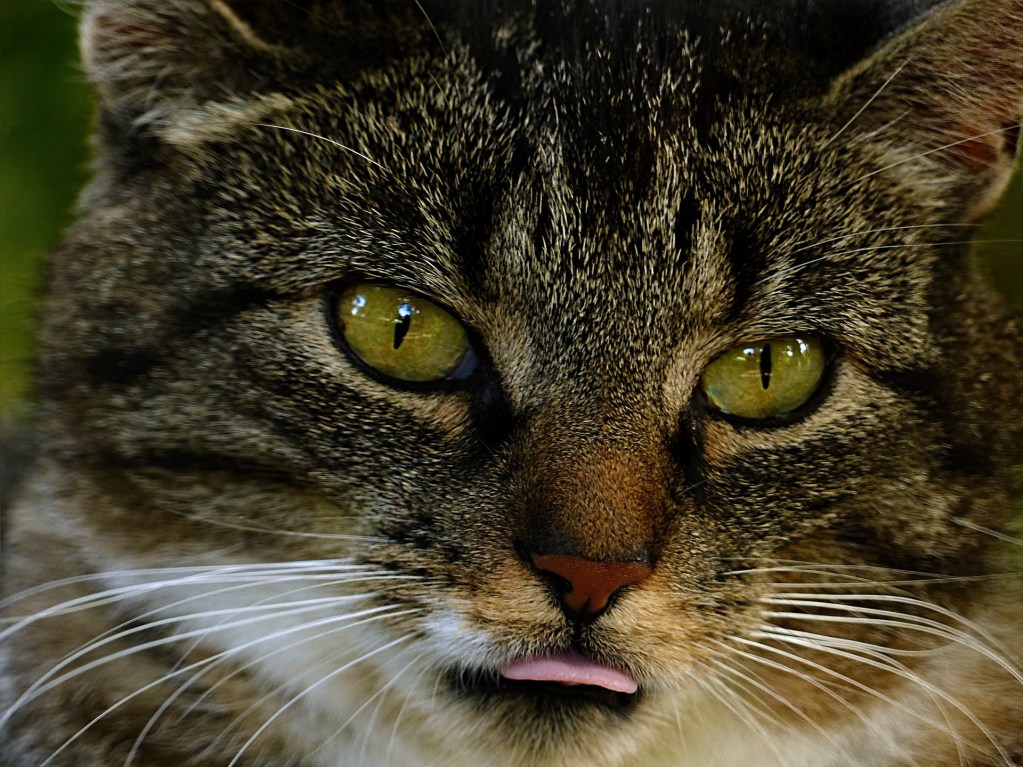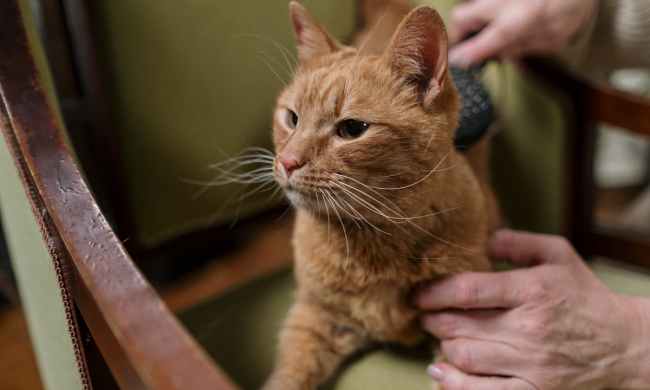
If you’ve ever wondered, ‘why do cats stick out their tongues?’ you’re not alone. Whether you’ve noticed your cat doing it and wondered if something might be wrong with them, or you’ve simply seen a cute TikTok, try not to worry. Most cats occasionally “blep,” or stick their tongues out, and it’s rarely cause for concern. In fact, it’s downright adorable! (Search for ‘cat bleps’ online when you’re feeling down; the precious images are the perfect pick-me-up.)
What causes cats to blep? We’ll explore a few potential reasons behind this strange yet adorable behavior.

Why do cats stick out their tongues? Do you need to worry about it?
Your cat is exploring the world with their tongue
One of the most common reasons for an exposed tongue is rather simple: your cat is literally exploring their surroundings. When your cat leaves their mouth open and tongue out, they’re collecting pheromones on their tongue — this is called the Flehmen response. Those pheromones give your cat important information about other cats around, including whether they’re in heat, via electrical signals from body to brain. Who knew something so cute could be so helpful, too?
Your cat may show their tongue if they’re missing teeth
Sometimes cats let their tongue hang out a little because they’re missing their canine or front teeth. These teeth help keep the tongue within the mouth, so if your cat is missing one or two of these teeth, it’s more likely that their tongue will slip out from time to time. No worries!
Your cat is trying to please you with a behavior they think you like
You might even be reinforcing your cat’s sticking their tongue out without knowing! If you laugh at your cat, give them attention, or give them a treat when they do this behavior, they may quickly learn that sticking their tongue out gets a positive response. You might start to see your cat do this repeatedly, mainly to get a positive reaction from you. Whether that’s ‘good’ or not is up to you to decide.
Your cat may let their tongue fall out of their mouth when they’re relaxed
Sometimes, when cats are relaxed, their tongues naturally slip out. This happens because your cat’s jaw loosens up as they relax, so their mouth opens up just enough to let the tongue through.
If your cat is sticking their tongue out because they’re relaxed, it’s most likely to happen when you’re patting them or when they’re asleep, though it may be more common in older cats with less muscle control. Once your cat wakes up or focuses on something else, you’ll probably notice them pull their tongue back into their mouth, swallow, and turn their attention elsewhere.
Your cat is grooming themselves
Despite their cute appearance mid-blep, your cat’s tongue is actually a powerful instrument adorned with small, sharp hooks that create that distinctive, sandpaper-like texture. These hooks, which are called papillae, effectively eliminate loose hair and debris from their fur. During periods of rest from grooming, cats might casually let their tongues hang out.
Your cat may have something stuck to their tongue
Unlike human tongues, cat tongues are dry and rough. It’s quite easy for tiny particles like dust or hair to get caught on their tongues, especially when grooming themselves. Think about how annoying it is when a hair gets in your mouth — and then think about how much more annoying that must be for a cat! If this is the case, though, your cat will probably act annoyed or paw at their tongue.

When to be concerned about a cat sticking out their tongue
Even though, in numerous instances, it’s normal for your cat to stick their tongue out sometimes, there can be physical issues behind this behavior that require more attention. These can be dental concerns, physical abnormalities, or even neurological conditions.
Your cat may blep when experiencing dental issues
If your cat is having a dental issue, they might stick their tongue out in response. Issues like an abscess, gum disease, or even tooth decay can be painful and might elicit this behavior. Inflammation or an infection can also prompt your cat to stick their tongue out due to less space in their mouth. If you suspect a dental concern, a trip to the vet will be your best bet at easing their discomfort.
Health issues can cause a cat to stick their tongue out more often than normal
Other significant health issues like stomatitis (inflammation of the mouth) can cause significant discomfort and might make your cat stick their tongue out in response. Sometimes a tongue hanging partially out can even indicate that your cat has a health issue like dementia or loss of muscle control.
If you’re worried that your cat’s behavior is unusual and might be caused by a health issue, schedule an appointment with your vet. Your vet will probably start with a thorough examination of your cat’s mouth and throat. Then, they’ll likely do an overall wellness exam to make sure there aren’t any other significant health problems going on.

How to keep a cat comfortable when they stick their tongue out
Even though most cases of the bleps aren’t cause for concern, you may be wondering whether your feline friend is comfortable with their tongue out. And many times — they are! When a cat sticks their tongue out due to relaxation or picking up pheromones, they can easily put their tongue back in their mouth when it feels dry. A kitty with something stuck on their tongue may need a helping hand, but they’ll be fine as soon as the offending object is removed.
When a cat is dealing with a chronic issue that results in their tongue falling out, a little TLC can help them get a lot more comfortable. They’ll be pain-free after treating any physical or dental problems, and a little extra water throughout the day can keep them hydrated and comfy.
A cat sticking their tongue out definitely tends to be normal, though. How often you see this behavior really depends on your cat; some seldom do this, while others might stick their tongues out several times a day. With many potential causes behind this behavior, you will need to observe your cat carefully to determine just what’s prompting this.
In most cases, the behavior is harmless, but sometimes it can indicate an underlying health issue that needs a look. If your cat is sticking their tongue out an unusual amount, or if you see it paired with excessive drool or blood, call your vet right away to have your cat checked out. Otherwise, keep an eye on this behavior just in case, but chances are your cat is just fine. Enjoy it!


